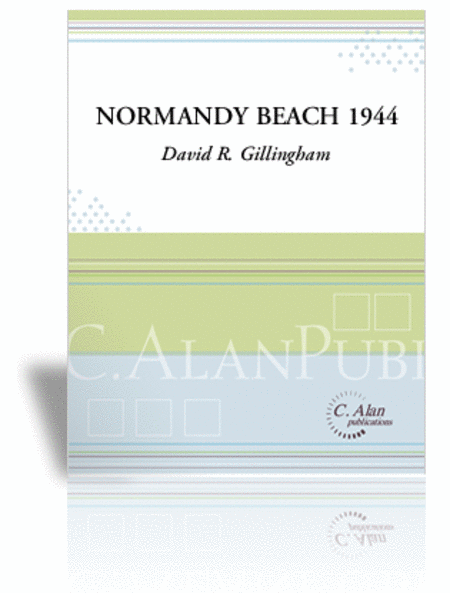Normandy Beach - 1944 (score only)
-
Ships in 3 to 4 weeks
Details
Description
SKU: CN.02131
Composed by David Gillingham. Score only. Duration 8:10. Published by C. Alan Publications (CN.02131).Using haunting bugle calls and quotes from the "Star-Spangled Banner" and "America, the Beautiful," Gillingham has crafted a poignant tribute to those who lost their lives on the beaches of Normandy on D-Day.
On June 6, 1944, at dawn, British and American forces landed on the beaches of Normandy in an elaborate amphibious operation. A total of 425,000 American, British, and German men lost their lives in the ensuing conflict. Normandy beach was composed in commemoration of this important, yet tragic day that changed the course of World War II. The work is cast in three sections. The first section is dark and mysterious and slow in tempo, characterizing the preparation and eve of D-Day. There are long pedal points mixed with poignant dissonance. Small two-note utterances by bowed marimba can be heard within this section which allude to distant bugle calls. Gathering pitch density and motion, the movement segues into the second section, which depicts the tragic conflict on D-Day, beginning with much motion and counterpoint between the four marimbas. Underlying this agitation in the marimbas are explosive articulations by tom-toms and anvil. The low marimbas settle into an ostinato of running sixteenth notes with the high marimbas playing a haunting motive reminiscent of the bowed bugle calls of the first section. Ensuing is a repetitive and hammered rhythm in the upper marimbas under which the low marimbas allude to the second phrase of the "Star Spangled Banner." The hammered rhythm becomes incessant and finally subsides into a dark and mysterious presentation of the first phrase of "America, the Beautiful" in chorale style. All motion ceases and the final section or epilogue follows. Beginning in a similar fashion to the first section, a sad and plaintive chorale transpires in the marimbas, suggesting the aftermath of this tragic day on June 6, 1944. Motivic remnants of "America, the Beautiful" intercede with the chorale and the work ends on dark dischord over a pedal F-sharp. You can hear a recording of Normandy Beach on David Gillingham's CD, 'Stained Glass' (also available from C. Alan).

 Share
Share